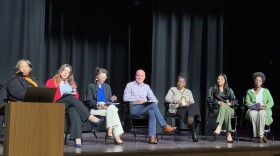The U.S. Supreme Court ruled 6-3 today against the "independent state legislature" theory, in a case brought by North Carolina legislative Republicans. They said they should be free to draw Congressional maps and set election rules without any oversight from the state’s judicial branch, which had previously ruled some gerrymandered maps unconstitutional.
The court ruled that legislatures are not totally independent when it comes to elections, that state constitutions can set voting rules and state courts can enforce those rules. But while Moore v. Harper could have a big impact in restraining other state legislatures, the North Carolina GOP will still have near-complete control of drawing new maps this summer.
The U.S. Supreme Court’s decision Tuesday was essentially moot after the Republican-majority state Supreme Court ruled in April that the legislature could engage in partisan gerrymandering when drawing maps.
The state’s congressional map today has seven Republicans and seven Democrats. The new map — expected to be drawn this summer — will likely give the GOP the advantage in at least 10 seats.
Political strategists on both sides expect GOP lawmakers to target Democratic Congressmen Jeff Jackson of Charlotte, Kathy Manning of Greensboro, and Wiley Nickel of Cary. Their seats could be drawn to include more Republicans.
The only brake on Republican mapmakers’ power is a different U.S. Supreme Court decision from earlier this month. Justices rejected a congressional map from Alabama that diluted the strength of Black voters.
That decision means North Carolina Republicans must consider race as a factor when drawing new maps — and that they can’t target African American voters.
That decision could help Democrat Don Davis, a Black congressman from the rural northeast.
Reactions to the ruling swiftly poured in from politicians and advocates in North Carolina. NAACP North Carolina State Conference President Deborah Maxwell called the decision "a major victory for voting rights, for checks and balances, and for everyone who values the sanctity of our democracy in the United States."
Democratic state Gov. Roy Cooper echoed that sentiment, but with a note of caution.
"This is a good decision that curbs some of the power of Republican state legislatures and affirms the importance of checks and balances. But Republican legislators in North Carolina and across the country remain a very real threat to democracy as they continue to pass laws to manipulate elections for partisan gain by interfering with the freedom to vote," Cooper said in a statement.
The N.C. Supreme Court has a 5-2 Republican majority.
Even former President Barack Obama weighed in, calling the N.C. General Assembly Republican majority's argument a "far-right theory that threatened to undermine our democracy."
Today, the Supreme Court rejected the fringe independent state legislature theory that threatened to upend our democracy and dismantle our system of checks and balances.
— Barack Obama (@BarackObama) June 27, 2023
Jeannette Doran, president of the conservative think tank North Carolina Institute for Constitutional Law, predicted the ruling will have a narrow effect. "The state courts will still have to stay in their lane and stick to ordinary judicial review," Doran said in a statement.
Republican N.C. House Speaker Tim Moore, who brought the suit, said in a statement Tuesday that "Fortunately the current Supreme Court of North Carolina has rectified bad precedent from the previous majority, reaffirming the state constitutional authority of the NC General Assembly. We will continue to move forward with the redistricting process later this year."








